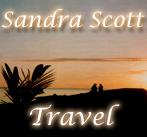

O' Henry's Honduras
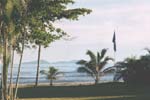
Where Time is Redundant
Text and Photos
by Sandra Scott
"Cabbages
and Kings"
John and I made our annual trip to check on our property outside of
Trujillo, Honduras, at the eastern end of the north shore highway.
Beyond is the Moskitia jungle. While John labored in the tropical sun
doing his part to reforest the tropics by overseeing the planting of
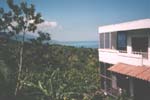 mahogany
and Honduran cedar trees, I lounged in the shady end of the pool reading
a book set in Trujillo, O. Henry's "Cabbages and Kings." Incredibly,
the personalities and politics have changed little in the one hundred
years since O. Henry tried to evade an embezzlement charge in the US
by hiding out in Trujillo, which is still "…set like a little
pearl on an emerald band." We were the only guests at Casa Cristina
($300 a week, cristina@hondutel.hn)
where we had an efficiency apartment that clings to the hillside with
a paradisiacal view of the mountains and the Caribbean so vast it seemed
I could see the curvature of the earth.
mahogany
and Honduran cedar trees, I lounged in the shady end of the pool reading
a book set in Trujillo, O. Henry's "Cabbages and Kings." Incredibly,
the personalities and politics have changed little in the one hundred
years since O. Henry tried to evade an embezzlement charge in the US
by hiding out in Trujillo, which is still "…set like a little
pearl on an emerald band." We were the only guests at Casa Cristina
($300 a week, cristina@hondutel.hn)
where we had an efficiency apartment that clings to the hillside with
a paradisiacal view of the mountains and the Caribbean so vast it seemed
I could see the curvature of the earth.
Buccaneers
and Brigands
Trujillo has had its "moments in the sun." On August 14, 1402,
during his fourth voyage, Columbus landed for the first time on the
American mainland near Trujillo. It is also where the first Catholic
mass was said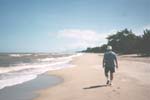 on the mainland. A fort built in the 1500s, and currently being restored,
did not prevent the town from being sacked by Dutch, French, and English
pirates on several occasions. And, a fascinating piece of history, familiar
to all Central Americans occurred there in the mid-1800s. William Walker,
an American filibuster who tried to seize parts of Mexico and Central
America, and even for a short time headed the government of Nicaragua,
was captured in Trujillo where the sites of his execution and burial
are commemorated.
on the mainland. A fort built in the 1500s, and currently being restored,
did not prevent the town from being sacked by Dutch, French, and English
pirates on several occasions. And, a fascinating piece of history, familiar
to all Central Americans occurred there in the mid-1800s. William Walker,
an American filibuster who tried to seize parts of Mexico and Central
America, and even for a short time headed the government of Nicaragua,
was captured in Trujillo where the sites of his execution and burial
are commemorated.
The Floating
City
Trujillo is so far east, recovery from the double whammy of Hurricane
"Mitch" and 9-11 is progressing slower than in other parts
of Honduras. But, hope springs eternal in the land O. 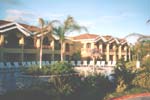 Henry
dubbed Anchuria, "the land where anything goes." Worthy of
a chapter in his novel, "a scheme has showed itself" and has
local romantics waiting for a new renaissance with the proposed building
of the "The Floating City," www.freedomship.com,
in Trujillo Bay which promoters say will be a city of 20,000 that will
continuously circle the world. Accommodations in this "city,"
four times the size of an aircraft carrier, will average one million
dollars.
Henry
dubbed Anchuria, "the land where anything goes." Worthy of
a chapter in his novel, "a scheme has showed itself" and has
local romantics waiting for a new renaissance with the proposed building
of the "The Floating City," www.freedomship.com,
in Trujillo Bay which promoters say will be a city of 20,000 that will
continuously circle the world. Accommodations in this "city,"
four times the size of an aircraft carrier, will average one million
dollars.
Denouement
In keeping with an O. Henry story our trip ended with a wonderful surprise.
The Barcelo hotel chain has "awakened the beautiful tropics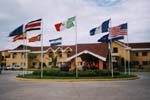 from their centuries' sleep" with the opening of Palma Real, on
a 1200-foot long beach east of La Ceiba. The world-class all-inclusive
resort is the very first on the Honduran mainland. Palma Real ($68 pp
all inclusive, www.barcelo.com),
while still expanding, has several pools, restaurants, daytime activities,
a casino, and Vegas-style shows in the evening including a folkloric
show celebrating the dances of the different cultures of Honduras. The
disco is the place to learn the "hot" new dances, Mayonesa
and Astieje, that have replaced the Macarena.
from their centuries' sleep" with the opening of Palma Real, on
a 1200-foot long beach east of La Ceiba. The world-class all-inclusive
resort is the very first on the Honduran mainland. Palma Real ($68 pp
all inclusive, www.barcelo.com),
while still expanding, has several pools, restaurants, daytime activities,
a casino, and Vegas-style shows in the evening including a folkloric
show celebrating the dances of the different cultures of Honduras. The
disco is the place to learn the "hot" new dances, Mayonesa
and Astieje, that have replaced the Macarena.
Hog Wild
At Palma Real we took advantage of one of their day tours ($55 pp) to
visit a place I had long wanted to see - Cayos Cochinos (Hog Islands)
Biological Reserve. We bounded over the Spanish Main, stopped at a 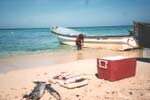 fisherman's
cay ringed by blue-green waters where the morning catch was being cleaned
on the beach and pelicans waited for their share of leftovers. A ten-minute
walk took us around the entire cay. Then it was off to snorkel in the
calm waters between the two large islands. Snorkeling gives me a feeling
of omnipotence as I look down on the world of the iridescence parrotfish,
blueheads, butterfly fish and velvety blue tangs.
fisherman's
cay ringed by blue-green waters where the morning catch was being cleaned
on the beach and pelicans waited for their share of leftovers. A ten-minute
walk took us around the entire cay. Then it was off to snorkel in the
calm waters between the two large islands. Snorkeling gives me a feeling
of omnipotence as I look down on the world of the iridescence parrotfish,
blueheads, butterfly fish and velvety blue tangs.
An irritating
dream
O. Henry was right when he wrote Honduras is a land "Where time
is redundant." The redundancy of swimming, walking the beach, and
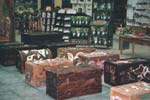 hanging
out in the hammock was idyllic. After only a few days in Honduras, "Those
old days of life in the States seemed like an irritating dream."
Three weeks passed all too quickly and it was time to go home to prepare
for our next adventure. But, before leaving Honduras we made our annual
stop at Imapro in El Progresso just a half an hour east of the airport.
Each time we just plan to look at the great hand carved articles, but
we always end up buying something… usually one of the carved wooden
boxes.
hanging
out in the hammock was idyllic. After only a few days in Honduras, "Those
old days of life in the States seemed like an irritating dream."
Three weeks passed all too quickly and it was time to go home to prepare
for our next adventure. But, before leaving Honduras we made our annual
stop at Imapro in El Progresso just a half an hour east of the airport.
Each time we just plan to look at the great hand carved articles, but
we always end up buying something… usually one of the carved wooden
boxes.
Search the Web for related information on Honduras